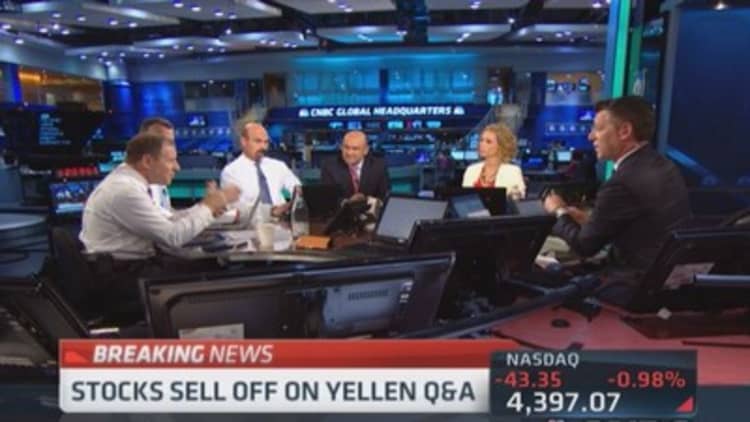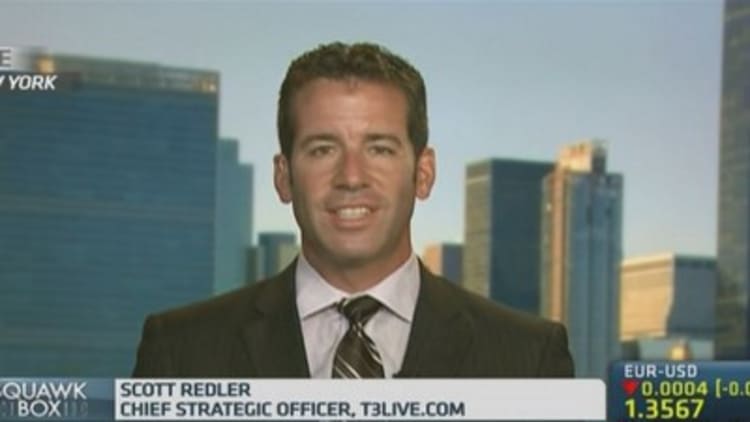
The Federal Reserve's unusually targeted comments that biotech and social media stocks are overheated sucked the wind out of a rally that had taken the to a new high in early trading.
In a section of its Monetary Policy report released Tuesday, the Fed noted: "...signs of risk-taking have increased in some asset classes. Equity valuations of smaller firms as well as social media and biotechnology firms appear to be stretched, with ratios of prices to forward earnings remaining high relative to historical norms."
The small cap Russell 2000, home to small cap and many speculative names, led the declines, losing more than 1 percent in late morning trading. The Dow was off just slightly but had erased a 64-point gain that took it to a new all-time high of 17,120.
The remark echoes the most famous shot at the stock market taken by the Fed in December 1996, when Fed Chairman Alan Greenspan used the term "irrational exuberance." He was describing a run up in stocks that ended more than three years later with the bursting of the tech bubble.
"I think when the Fed starts saying certain parts of the market are overvalued, I think you shoot first and ask questions later," said Daniel Greenhaus, global market strategist at BTIG.
Fed Chair Janet Yellen was testifying before the Senate Banking Committee in her semiannual testimony Tuesday morning as the Fed released its latest Monetary Policy Report.
Read MoreYellen's 'stretched valuations' remark no surprise
That comment punctured shares of many high fliers and weighed on the overall market. Biotech stocks slumped, and the iShares Nasdaq Biotech ETF IBB fell nearly 2 percent. Social media stocks like Yelp, Facebook and Pandora all fell.
"It certainly is unusual to have the Fed target specific parts of the market. But in the wake of the 2000 tech bubble and the housing bubble the Fed is increasingly focused on areas of overvaluation that can be targeted without raising rates," Greenhaus said. "They're trying to talk them down."
The Fed has commented on its concerns about an overly bubbly leveraged loan market previously, and individual officials have warned about overheated sectors of the stock market in the past. New York Fed President William Dudley specifically mentioned biotech stocks in comments made in March. Fed Gov. Daniel Tarullo in February said that only some assets, like the stocks of some small tech companies and also farm land, show stretched valuations.
Read MoreMeet the most hated part of the stock market: small caps
Yellen, in her testimony, said the overheated parts of the market are contained, and there is only overvaluation in pockets, amid signs of investors reaching for yield. In its report, the Fed also noted the tight spreads in corporate bonds and high yield markets.
The Fed also noted in its report that the implied volatility in the was at levels not seen since the 1990s and 2000s, a sign of "improved market sentiment" and "perhaps influence of reach for yield behavior."
"Low rates do have an incentive to push individuals to look for yield, to reach for yield, and that is both a good thing and a bad thing," Yellen told Congerss. "...Of course, we have to be careful about looking for situations where low rates can be incentive for behavior that can be dangerous to financial stability."

She noted that the Fed has been monitoring leveraged lending and has seen a marked deterioration in underwriting standards. "We're trying to deal with it through supervisory means," she said.
The Fed, in its report, is targeting a part of the stock market that has attracted speculative investing and many on Wall Street have been monitoring as an overheated part of the market.
Oppenheimer Asset Management technician Ari Wald Monday said a good short-term strategy would be to short the Russell and stay long the S&P 500. Long-term investors should hold the S&P 500 since it should perform better in a market correction, he recommends.
Read MoreFed worries over 'stretched' valuations
The Russell is still viewed by many as overvalued even after falling nearly 4 percent last week.
"Small caps did well in the last few years. In the last couple of months, we've seen the trend toward big caps," Wald said.
Wald said the Russell's behavior does not necessary mean the broader market is setting up for a correction. "If you want to pick up on this one market, it's troublesome," he said. "The overall market isn't as bad as the divergence is suggesting."
Read MoreVolatility should remain elevated, small caps at most risk
Wald said there are positive signs, such as improving advanced/decline line on the NYSE. "Leadership is very strong, and we haven't seen leadership into mega cap names. If you were expecting a market top, you would be expecting mega caps to be leading," he said.
Greenhaus said the Russell has failed to hold the 1200 level three times. "Now you revisited it in July, and now you're probably going to go back down," he said, adding support is at around 1100.
Technicians also note that the Russell failed to close above its old high, unlike the Dow and S&P, and that was a negative.
—By CNBC's Patti Domm.


